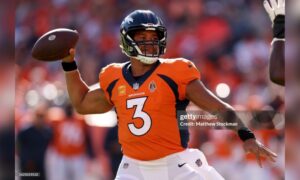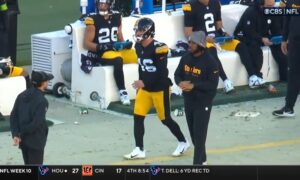Before we wrap up this study, which draws connections between Super Bowl successes and first-team All-Pro performances, I wanted to more clearly lay out what the purpose of this project is in the first place.
It should be transparent that the germ of the idea stems from the Pittsburgh Steelers and their running back, Le’Veon Bell, who are locked into negotiations that don’t appear to be getting close enough to reach an agreement, even while there are still months available for them to do so.
Many have presented the counterargument that you do not have to have a featured, franchise running back to win a Super Bowl. After all, you can just look to the two teams that competed in the Super Bowl this past year, right? There has not been a Super Bowl champion since 1999 that featured a running back who was a first-team All-Pro in the year that they won, which means that there is not a significant correlation between having the best running back of the season and winning the Super Bowl in that season.
But what if I told you that there is not a significant correlation between first-team All-Pro wide receivers, or even first-team All-Pro quarterbacks, and Super Bowl victories? What if I presented you data that indicates only a marginal correlation between having the best players at the most important offensive positions in a given year and actually winning the game that everybody is trying to win?
If this is the case, then the argument that a team should not commit such a huge amount of resources to a running back because there is not a strong correlation between such performances and Super Bowl victories—a frequent argument against the Steelers signing Bell—also applies to wide receivers, and even quarterbacks.
| Year | Super Bowl Champions | 1st-Team All-Pro RB | 1st-Team All-Pro WR | 1st-Team All-Pro QB |
|---|---|---|---|---|
| 2017 | Eagles | |||
| 2016 | Patriots | Tom Brady | ||
| 2015 | Broncos | |||
| 2014 | Patriots | |||
| 2013 | Seahawks | |||
| 2012 | Ravens | |||
| 2011 | Giants | |||
| 2010 | Packers | |||
| 2009 | Saints | Drew Brees | ||
| 2008 | Steelers | |||
| 2007 | Giants | |||
| 2006 | Colts | Marvin Harrison | ||
| 2005 | Steelers | |||
| 2004 | Patriots | |||
| 2003 | Patriots | |||
| 2002 | Buccaneers | |||
| 2001 | Patriots | |||
| 2000 | Ravens | |||
| 1999 | Rams | Marshall Faulk | Isaac Bruce | Kurt Warner |
| 1998 | Broncos | Terrell Davis | ||
| 1997 | Broncos | Terrell Davis | ||
| 1996 | Packers | Brett Favre | ||
| 1995 | Cowboys | Emmitt Smith | ||
| 1994 | 49ers | Jerry Rice | Steve Young | |
| 1993 | Cowboys | Emmitt Smith | Troy Aikman | |
| 1992 | Cowboys | Emmitt Smith | ||
| 1991 | Redskins | Gary Clark | ||
| 1990 | Giants | |||
| 1989 | 49ers | Jerry Rice | Joe Montana | |
| 1988 | 49ers | Roger Craig | Jerry Rice | |
| 1987 | Redskins | Gary Clark | ||
| 1986 | Giants | Joe Morris | Phil Simms | |
| 1985 | Bears | Walter Payton | ||
| 1984 | 49ers | |||
| 1983 | Raiders | |||
| 1982 | Redskins | |||
| 1981 | 49ers | |||
| 1980 | Raiders | |||
| 1979 | Steelers | John Stallworth | ||
| 1978 | Steelers | Lynn Swann | Terry Bradshaw | |
| 1977 | Cowboys | Drew Pearson | ||
| 1976 | Raiders | Cliff Branch | Ken Stabler | |
| 1975 | Steelers | Lynn Swann | ||
| 1974 | Steelers | |||
| 1973 | Dolphins | Larry Csonka | Paul Warfield | |
| 1972 | Dolphins | Larry Csonka | Paul Warfield | Earl Morrall |
| 1971 | Cowboys | |||
| 1970 | Colts | |||
| 1969 | Chiefs | |||
| 1968 | Jets | Don Maynard | Joe Namath | |
| 1967 | Packers | |||
| 1966 | Packers | Bart Starr |
The peculiar fact of the matter is that the correlation between first-team All-Pro performances at wide receivers, running backs, and quarterbacks has all but dried up in recent years. Of the past 18 Super Bowl winners, a whopping three teams have featured a first-team All-Pro year from any of those positions. That’s just 16.7 percent of the 18 most recent championship teams.
The correlation was far stronger prior to the past two decades. From the first Super Bowl through the 1990s, 23 of the 34 Super Bowl champions had at least one first-team All-Pro that those positions in the year that they won. That’s a whopping 67.6 percent.
Is it just a statistical anomaly that roughly the first two thirds of the history of the Super Bowl prominently featured champions with first-team All-Pro offensive performances, with the most recent third of that history seeing that almost dry up? In all, only half of all Super Bowl winners have had even a single first-team All-Pro at any of those three positions in the year that they won.
At the end of the day, it’s clear that there has not for some time now been a strong correlation between first-team All-Pro-level performances at the key offensive positions and Super Bowl success. With that in mind, the argument that this should be used against the running back position in the open market holds no water unless it is also applied to wide receivers and quarterbacks.
With that in mind, I would like to solicit feedback on this study and on further ideas for research, as well as to gain interest in such research. The scope of this study is fairly limited. If you would like to see an expanded study, either with a wider net for these positions or with other positions included now is the time to provide feedback, as what I do next, if I do anything at all, will potentially be built around your suggestions.








